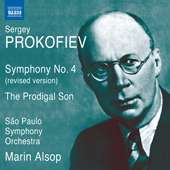|
Back
12/28/2013
Sergey Prokofiev: Symphony No. 4 (revised version), Op. 112 – L’Enfant prodigue, Op. 46
São Paulo Symphony Orchestra, Marin Alsop (conductor)
Recorded at the Sala San Paulo, Brazil (2012) – 78’13
Naxos CD8.573186 – Notes in English

   
Sergey Prokofiev was at the peak of his international fame when he composed L’Enfant prodigue , his final ballet score for Sergei Diaghilev’s Ballets Russes, in 1929. It is hard to listen to Prokofiev without considering the circumstances in which he composed as he led a life of such self-determined, ordered chaos. He never stopped working whether it was with almost complete artistic freedom of his years in Paris or later in Russia under the strictures of Stalinism.
In Paris Prokofiev thrived, though he had a dicey professional relationship with Diaghilev. The Prodigal Son score was composed quickly and was tainted by the fact that the composer did not like George Balanchine’s choreography; meanwhile, the prickly Diaghilev actually thought this to be Prokofiev's best ballet score thus far.
Shortly after Prokofiev finished Prodigal he expanded the score into what was to be his Symphony No. 4. He played it on piano for his friend, Russian composer Vladimir Dukelsky. Prokofiev reports in his diary that Dukelsky didn’t hold back in his reaction. “ To combine symphonic music with purely ballet music is the height of ignorance", Dukelsky said.
Prokofiev further explained that in fact he agreed with Dukelsky but that “on this occasion it was only because there was quite a lot of undeveloped material left over from the ballet, and some ideas that it had not been possible to include and I was reluctant to waste them.” He writes in his diary. The Symphony also met with resistance by Boston Symphony conductor Serge Koussevitsky as a commissioned work to premiere for BSO’s 50th Anniversary the following year.
Of not insignificant note, the symphony was further revised in 1947, with Prokofiev repatriated in Russia, but only in tentative favor with the Union of Soviet Composers. The work fell under the judgment by them the very next year that Prokofiev’s music be banned from concert halls. Symphony No. 4 did not have its Russian premiere until 1957, four years after the composer’s death.
It is this 1947 version that conductor Marin Alsop chose to be recorded on the same disc with the ballet score, leading the estimable São Paulo Symphony Orchestra. However this seems more an exercise for musicians and avid Prokofiev fans. Hearing these works in tandem points up how much stronger the ballet is. Alsop essays an academic, almost static performance of the work. Consideration should have been given to switching the order, with Prodigal first on the recording, or better yet, chosing another Prokofiev ballet to go with Prodigal.
Meanwhile, without doubt, the orchestra brings clean interpretive character to the ballet score and symphonically tells the story. Maestro Alsop keeps the theatrical intensity of the orchestral narrative arc in the ballet score; the character of the music pulses with theatricality. The bacchanalian scenes of seduction and drunkenness burst forth with vivid luster on the recording - in fact has a live feel it is so robust. The oboe, flute, and brass snake around each other in commedia dell’arte debauchery. Admirably Maestro Alsop doesn’t lean on the more sonic and cinematic accents, which happens frequently with Prokofiev’s ballet music. By virtue of these qualities, this recording makes me want to hear more from Alsop and SPSO.
Lewis Whittington
|